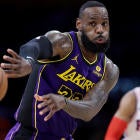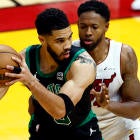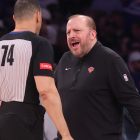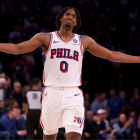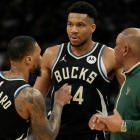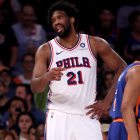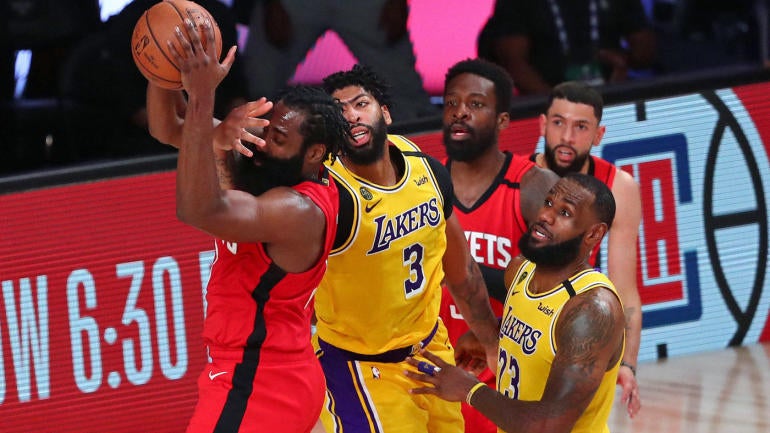
It is one thing to be an exceptionally great player. It is something else entirely to channel and tap into that greatness in the exceptionally important and pressure-filled moments of the NBA playoffs.
That reality -- and the stark gulf between greatness in the moment, and greatness overwhelmed by it -- was on vivid display Thursday night in the Lakers' 110-100 win over the Houston Rockets to put them up 3-1 in the second-round playoff series.
On one end of this equation, behold LeBron James: Even with a mild 16 points, 15 rebounds and nine assists he was the quintessential winner, and his team followed suit.
On the other, see James Harden: 2 of 11, a misleading 21 points on the night, most coming at the free-throw line, as the Beard braved literally nothing in a fourth quarter in which he did not take a single shot.
Not one. Not one field-goal attempt.
On the one hand, quiet excellence. On the other, silent abdication.
So we know this now: Harden is no playoff hero, and he's unlikely ever to be. He has simply failed, so many times, to turn these biggest of basketball moments into anything other than disappointment. As Kevin O'Connor at The Ringer pointed out before the Rockets had even bested the Thunder in the first round, over the past five years Harden has shot less than 25 percent from the 3-point line in playoff fourth quarters and overtimes.
What Harden did Thursday night was even more problematic: He accepted what too many of us already know. That he can't do it. That he won't do it. That he hasn't done it, and that as a result a Rockets team that won Game 1 of this series, that entered the fourth quarter of Game 2 up two, that entered the fourth quarter of Game 3 tied -- a Rockets team one capable MVP away from having a real chance -- will soon be eliminated.
We have been spoiled by greatness from guys like Kawhi, LeBron, Kobe, Duncan, Shaq, Jordan, Isaiah, Bird and Magic. We believe that stars like these should always take their regular-season talents and automatically perform at the same level despite the pressure, angst and difficulties of the playoffs.
Harden reminds us there are no such guarantees. That for every All Time Great, there are so many who had the talent, just not the greatness.
The amazing thing about the NBA playoffs, and Harden's fourth-quarter cowardice during this series in particular, is that a history of failure or a reputation for playoff struggles is always just one magical run from the narrative flipping completely.
Clayton Kershaw is still waiting for his playoff redemption, and it certainly could arrive this year if he and the Dodgers can finally win it all. Philip Rivers' window is closing, too, but the Colts may offer a fresh start and improved shot at playoff greatness. We'll see. These things can change, as they could have for Harden, had he not vanished in this series when his team got him to the brink.
It wasn't that Harden didn't have a chance to show his mettle in these moments. He did. He just failed, playing scared and awkward basketball, so on brand it's painful to watch.
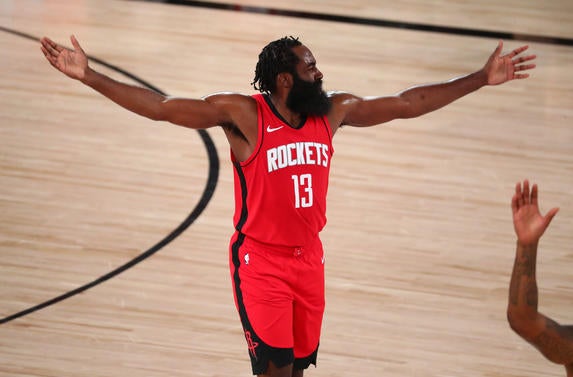
There's still time, of course, for Harden to turn things around. Others have done it.
John Elway couldn't win the big one, until, at the end of his career, he snagged two Super Bowl wins. Stephen Strasburg was the poster boy for fear -- in this case of injury -- short-circuiting a team's championship plans, until last year. Even LeBron James, now one of the greatest playoff performers in American sports history, struggled mightily under the weight of the toxic Big 3 storyline in the 2011 NBA Finals against Dallas.
Houston had a unique plan, under a unique coach, with a unique talent in Harden and a new sidekick in Russell Westbrook. The Rockets, too, could have flipped the script.
That they'll fail again is not Westbrook's fault. Westbrook, despite his shortcomings, has at least been willing to try, come what may. Sometimes, this series, he has tried and failed. Sometimes, like Thursday night's 25-point performance (including 10 in the fourth quarter), he's a net positive. But at least he's trying.
Failure is bad. Failure that becomes debilitating fear is worse.
This isn't Mike D'Antoni's fault, even if there were adjustments to be made. Because the fact is that the Rockets won Game 1, and they were in Games 2 and 3 late in the action, when stars must step up. And Harden, in those moments, is no star.
Kawhi and LeBron have made this look almost too easy, this playoff-performance-on-steroids thing they do, this Finals MVP greatness they've alternated among themselves for a good chunk of the past 10 years. The Western Conference will clearly go through their teams, and those two players, because those two players are great in the game's greatness moments.
That's rare. It's hard to do. And it's something many, many players have struggled with. Harden isn't alone on that list, but he may now headline it.
Harden has told us who he is: A star who dims in the spotlight, a Most Valuable Player in the regular season, who during playoff fourth-quarter showdowns turns into the Most Vanished Player.
I'd like to believe he can change that narrative, the way so many other players have turned failure and disappointment into greatness and victory.
But how do you believe in a player, even one as immensely talented as Harden, who doesn't believe in himself?
Shooters shoot. And Harden couldn't even do that much at the end of a game after his team frantically cut the score to five. Houston needed its version of LeBron, or Kawhi, even Jamal Murray or Kyle Lowry.
They needed a player to take over the game and be the star for the moment.
That's not Harden. And it's starting to look like it never will be.














